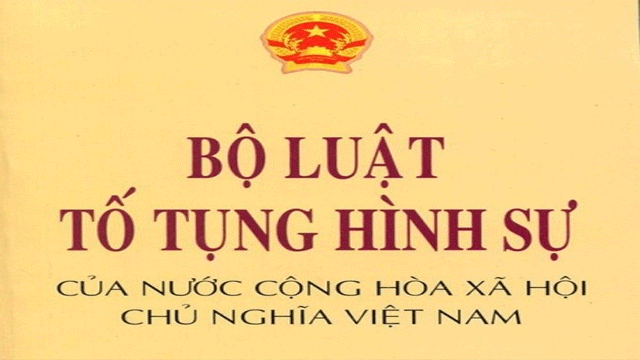This is the content of the Draft Resolution guiding the application of beneficial provisions for offenders in the Criminal Code 2015 and related provisions of the Criminal Procedure Code 2015 of Vietnam.

Relevant provisions of the Criminal Procedure Code 2015 shall be applied from July 01, 2016 to enforce beneficial provisions in the Criminal Code 2015. To be specific:
- Switching of the Death Penalty to Life Imprisonment in Vietnam
According to the Draft Decree, based on provisions in Clause 2, Article 367 of the Criminal Procedure Code 2015, a Decision to switch the death penalty to life imprisonment will be issued for cases specified in Clauses 2 and 3, Article 40 of the Criminal Code 2015; Points a, b, and c, Clause 2, Article 1 of Resolution 109/2015/QH13 dated November 27, 2015 of the National Assembly, and as guided in Clause 2, Article 1 and Article 2 of Resolution 01/2016/NQ-HDTP.
- Conditional parole
Upon receiving the application for conditional parole from the People's Procuracy of the province where the prisoner is serving the sentence, the Court must refer to the provisions in Article 368 of the Criminal Procedure Code 2015 to consider and settle the pardon.
- Criminal Record Expungement:
- Automatic expungement: Upon receiving a request for a certificate of expungement for a case eligible for automatic expungement, the Court must refer to the provisions in Article 369 of the Criminal Procedure Code 2015 to transfer the request for the certificate of expungement to the Department of Justice for resolution according to its authority.
- Expungement based on the court's decision: Upon receiving a request for a certificate of expungement from the convicted (accompanied by comments from the local commune-level government or the organization where they work), the Court must refer to the provisions in Article 369 of the Criminal Procedure Code 2015 to consider and settle the expungement certificate request.
- Criminal prosecution of minors
When applying beneficial provisions of the Criminal Code 2015 to offenders under 18 years old, the Court must follow the procedures in Chapter XXVIII of the Criminal Procedure Code 2015 on proceedings involving minors to settle the cases.

The Draft includes 152 beneficial provisions for offenders in the Criminal Code 2015. Some beneficial provisions are as follows:
| Beneficial Provisions | Article, Clause, Point |
| Determinate imprisonment “2. Determinate imprisonment shall not be imposed upon a person who commits a less serious crime for the first time and has a fixed residence.” |
Clause 2, Article 38 |
| Death Penalty “2. The death penalty shall not be imposed on... individuals aged 75 or above at the time of the crime or trial. 3. The death sentence shall not be executed on convicts who meet any of the following conditions: ...b) The sentenced person is 75 years of age or older; c) The person sentenced to death for embezzlement or taking bribes, after being sentenced, has returned at least three quarters of the property embezzled or bribes taken, closely cooperates with the authorities in the process of investigation or trial or has made reparation in an effort to atone for the crime.” |
Clauses 2 and 3, Article 40 |
|
Mitigating factors o) The offender is 70 years of age or older; p) The offender has a serious physical disability or extremely serious physical disability x) The offender is a parent, spouse or child of a war martyr or war veteran.” |
Points đ, o, p, and x, Clause 1, Article 51 |
|
Conditional parole 1. A person serving an imprisonment sentence (prisoner) may be granted parole when all of the following conditions are satisfied: a) The prisoner does not have prior criminal record; b) The prisoner shows remarkable improvements; c) The prisoner convicted of a serious crime, very serious crime or extremely serious crime has received a commutation; d) The prisoner has a fixed residence; dd) The prisoner has paid fines, legal costs and civil compensation in full; e) The prisoner has served at least half of determinate imprisonment or at least 15 years of life imprisonment commuted to determinate imprisonment. A prisoner who is a wounded soldier, sick soldier, member of a martyr's family, aged 70 or older, a person suffering from a serious physical disability or extremely serious physical disability, a woman raising a child under 36 months of age must serve at least one third of determinate imprisonment or at least 12 years of life imprisonment commuted to determinate imprisonment; g) The offence is not committed in any of the circumstances specified in Clause 2 of this Article. 2. Parole shall not be granted to: a) any prisoner that is convicted of infringement of national security; terrorism, disruption of peace, crimes against humanity, war crimes; any person sentenced to 10 years' imprisonment or longer for deliberate infliction of harm to human life, health or dignity; any person sentenced to 7 years' imprisonment for robbery, kidnapping for ransom, illegal manufacturing, trading, appropriation of narcotic substances; b) any person sentenced to death and granted commutation or any person in the circumstances specified in Clause 3 Article 40 hereof. 3. At the request of a competent criminal sentence execution authority, the Court shall decide granting parole. The person granted parole must fulfill his/her obligations during the probation period. The probation period equals (=) the remaining duration of the imprisonment sentence. 4. If the person granted parole deliberately fails to fulfill his/her obligations twice or more or receives 02 or more administrative penalties during the probation period, the Court might cancel the parole and force him/her to keep serving the sentence. If such person commits a new crime during the probation period, the Court shall force him/her to serve a combined sentence of the unserved sentenced and the new sentence as prescribed in Article 56 hereof. 5. After the person granted parole has served half of the probation period and shows remarkable improvements, at the request of the competent criminal sentence execution authority, the Court shall consider reducing the probation period. |
Article 66 |
|
Criminal Record Expungement “2. People convicted of involuntary and less serious crimes or serious crimes and people exempt from punishments are treated as if they do not have any criminal records.” |
Clause 2, Article 69 |
Detailed beneficial provisions for offenders in the Criminal Code 2015 may be found in the Draft Decree.
- Key word:
- beneficial provisions for offenders
- Vietnam
 Article table of contents
Article table of contents










.Medium.png)
.Medium.png)
.Medium.png)
.Medium.png)
